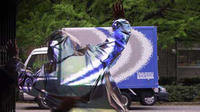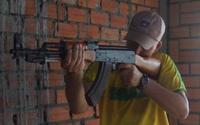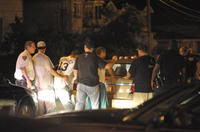-
A cautionary tale of local information sharing
Calhoun County, Alabama recently spent $850,000 on interagency communications equipment, but so far only one local police department uses it and the system is the source of significant tension among law enforcement officials across the county; poor communication, proprietary databases, and high costs have effectively prevented the county from creating an information sharing system for local law enforcement; each police department uses laptops tied to different servers with different information on them, and though each system was designed to share information, none of the departments’ databases can communicate with one another due to proprietary data and non-compatible physical infrastructure
-
-
Invisibility cloaks are hiding around the corner

In 1897 H. G. Wells created a fictional scientist who became invisible by changing his refractive index to that of air, so that his body could not absorb or reflect light; more recently, Harry Potter disappeared from sight after wrapping himself in a cloak spun from the pelts of magical herbivores; now, a Michigan Technology University researcher has found ways to use magnetic resonance to capture rays of visible light and route them around objects, rendering those objects invisible to the human eye
-
-
Fireballs neutralize biological weapons
A California company will develop fireballs that can neutralize biological weapons and infrared decoy flares that are nearly invisible to the naked eye; the company, the fireballs are among the counter-terrorism tools that Exquadrum plans to start testing soon at four abandoned military bunkers in Victorville, California
-
-
Engineers use Xbox Kinect to find earthquake survivors
A team of engineers at the University of Warwick in the United Kingdom has been working to develop a robot capable of entering unstable buildings and searching for survivors, such as the 200 purportedly missing after the 6.3 magnitude earthquake in Christchurch, New Zealand; until now, technology has relied on expensive laser-based equipment, but Warwick’s team has reconfigured Microsoft’s Xbox Kinect to identify places in which survivors may be
-
-
Alabama fire departments receive more than $1.5 million in DHS grants
The Lanier Volunteer Fire Department in Talladega County, Alabama just announced that it received a little over $100,000 from DHS through its assistance to firefighters grant program; the department’s chief Jerry Alfred said he plans to use the funds to purchase a rescue truck; several other local fire departments also received grants from DHS including the Sycamore Volunteer Fire Department which received $231,750 and the Oak Grove Volunteer Fire Department which got $185,250; DHS plans to award $1,564,732 to eighteen fire departments throughout Alabama
-
-
ATF pushes for power to track bulk assault rifle sales

As more guns used in the bloody Mexican drug wars are traced back to the United States, efforts to crack down on illegal gun smuggling rings in border states have struggled to gain more traction; last month, the House denied the Bureau of Alcohol, Tobacco, Firearms, and Explosives (ATF) an emergency request to track bulk sales of semiautomatic guns in border states; a 2009 Government Accountability Office (GAO) report found that an estimated 85 percent of guns seized by Mexican authorities originated from the United States; a recent investigation found that traffickers were purchasing as many as forty AK-47 rifles at a time from gun shops in the Phoenix area
-
-
Gun used to kill ICE agent in Mexico was bought in Dallas

Hundreds of thousands U.S.-made fire-arms are bought at U.S. gun shows then smuggled into Mexico, making the drug cartels better-armed and better-equipped then than the police; the cartels not only fight each other in the open, but have now brazenly taken on the police and the military directly, making vast swaths of Mexico ungovernable and pushing Mexico closer to becoming a failed state; since December 2006, more than 32,000 Mexicans have been killed in war; on 15 February, a U.S. federal agent — ICE agent Jaime Zapata — was killed in an attack at a roadblock in the central Mexican state of San Luis Potosi; he was killed with a gun bought in Dallas, Texas
-
-
New non-lethal weapon against terrorism: spicy pepper

Classic Tabasco sauce ranges from 2,500 to 5,000 Scoville units (the scientific measurement of a chili’s spiciness), while jalapeno peppers measure anywhere from 2,500 to 8,000 Scoville; India’s bhut jolokia has more than 1,000,000 Scoville units, and it is accepted by Guinness World Records in 2007 as the world’s spiciest chili; the Indian military has now developed a bhut jolokia hand grenade to be used against unruly mobs and to flush out hiding terrorists
-
-
Swiss institute developed IED Zapper
IEDs kill and injure more American and coalition soldiers in Afghanistan than any other weapons insurgents employ; differences in terrain and IED design, where the primary detonator may be constructed of plastic to circumvent metal detectors, make military robots by Foster-Miller, iRobot, and Black-I Robotics not always effective; researchers now suggest detonating hidden IEDs from afar by using an electromagnetic pulse
-
-
Police uneasy about cheap smart-phone scanner app
Just a few years ago, someone wanting to listen to the dispatches of their local police department had to purchase and program special equipment; now, modern technology has made it possible to transform popular smart phones into personal police scanners; police say that criminals could use the increased accessibility provided by the new technologies as a tool for committing crimes
-
-
Mobile emergency detection app for Android phones
DefenCall smart phone app for Android users will be released in the second quarter; in the event of an emergency, users can tap on the app and it will automatically call, send text messages, e-mail any number of people that the user designates; the app will send the user’s name, contact information, and GPS location in addition to contacting first responders; DefenCall is currently being marketed to students on college campuses, those with chronic medical conditions, and travelers; the app costs roughly seventeen cents per day
-
-
U.S. worries Gaddafi may use poisonous gas as chaos deepens

Libya has in its possession 9.5 metric tons of mustard gas, and 650 metric tons of precursor chemicals used for developing chemical agents; in 2003, following the invasion of Iraq, Col. Gaddafi’s government sent to the United States the critical infrastructure for its nuclear-weapons programs, including uranium hexafluoride stockpiles, centrifuge machines, and parts for a nuclear fuel-conversion facility; Libya also destroyed its longer-range missiles and 3,300 aerial munitions used to disperse mustard gas and other chemical agents; the program to eradicate Libya’s chemical agents, as well as its chemical weapons production facility, was delayed by spats between Washington and Tripoli over funding and logistics; “When you have a guy who’s as irrational as Gaddafi with some serious weapons at his disposal, it’s always a concern,” said a U.S. official
-
-
NYPD stopped more than 600,000 in 2010, highest number recorded

The New York Police Department stopped and questioned 601,055 people in 2010; Black and Latino men accounted for 85 percent of the stops; of those stopped, about 14 percent were given summonses or arrested; the remaining 86 percent were questioned, but not charged or issued a summons; it is not clear how many were frisked
-
-
Bill would allow police to turn illegal immigrants over to members of Congress
A new proposal from Texas state Rep. Lois Kolkhorst would allow law enforcement officials to drop off illegal immigrants at the offices of any U.S. senator or representative; the proposed bill only applies to illegal immigrants about to be released on bail or discharged after completing a sentence and does not detail what the U.S. senator or representative is supposed to do with them.
-
-
SC fire departments awarded $5.5 million DHS grant
Thirty-six South Carolina fire departments had been awarded DHS grants totaling $5.5 million to pay for new programs and equipment; the funds will be spent on 200 vehicle radios, 200 walkie-talkies, and 700 pagers for 36 fire departments in Spartanburg County
-
More headlines
The long view
Why Was Pacific Northwest Home to So Many Serial Killers?
Ted Bundy, Gary Ridgway, George Russell, Israel Keyes, and Robert Lee Yates were serial killers who grew up in the Pacific Northwest in the shadow of smelters which spewed plumes of lead, arsenic, and cadmium into the air. As a young man, Charles Manson spent ten years at a nearby prison, where lead has seeped into the soil. The idea of a correlation between early exposure to lead and higher crime rates is not new. Fraser doesn’t explicitly support the lead-crime hypothesis, but in a nimble, haunting narrative, she argues that the connections between an unfettered pollution and violent crime warrant scrutiny.
Bookshelf: Smartphones Shape War in Hyperconnected World
The smartphone is helping to shape the conduct and representation of contemporary war. A new book argues that as an operative device, the smartphone is now “being used as a central weapon of war.”
